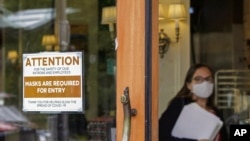Oregon Governor Kate Brown on Wednesday announced she was restoring a statewide indoor mask requirement for public settings as her state suffers from a record-breaking number of new coronavirus cases and hospitalizations, largely among unvaccinated individuals.
The statewide mandate applies to all Oregon residents older than 5, regardless of vaccination status, and is intended to curb the spread of the more transmissible delta variant, which is threatening the state’s hospital capacity.
“The harsh reality is that delta is a different virus. It has changed everything,” Brown said during a press briefing. “Modeling from the Oregon Health Authority and Oregon Health & Science University project that … without safety measures, we could be as many as 500 staffed hospital beds short of what we need to treat patients by September.”
The mask mandate is set to go into effect on Friday. Brown also announced that all state executive branch employees would have to be fully vaccinated by either October 18 or six weeks after a vaccine has been granted full approval by the Food and Drug Administration.
During the briefing, State Epidemiologist Dean Sidelinger emphasized that unvaccinated people posed the greatest threat to themselves and their community.
Hospital beds filling up
“Oregonians, sick with COVID, nearly all of them unvaccinated, are on the verge of overfilling our hospital beds, posing a critical threat to all Oregonians who need hospital care,” Sidelinger said.
Oregon reported over 2,300 new coronavirus cases Tuesday and 635 coronavirus hospitalizations, both record-high numbers for the state. According to Brown, nearly 90% of Oregon’s intensive care unit beds are filled.
The state ranks 12th in the nation for fully vaccinated residents, with 56% of the population fully vaccinated. About 50% of the entire U.S. population is fully vaccinated.
“If you haven’t made the choice to get vaccinated yet, delta is the game changer that gives you a reason to reconsider,” said Pat Allen, the director of the Oregon Health Authority.
Oregon joined Louisiana and Washington, D.C., in reinstating universal indoor mask requirements amid a national resurgence of the virus. The U.S. is averaging over 110,000 new COVID cases a day, up from a low of about 11,000 per day in June, according to Centers for Disease Control and Prevention data.
Nevada recently introduced a modified indoor mask mandate that applies to residents in counties with “substantial or high transmission,” while Hawaii never eliminated its indoor mask requirement in the first place.
The CDC in late July recommended that both vaccinated and unvaccinated people resume wearing masks indoors if they live in areas with “substantial or high transmission,” citing new data on the contagiousness of the delta variant.
Rates high in most counties
As of Monday, the CDC had labeled nearly 90% of all U.S. counties as having substantial and high transmission rates. The delta variant accounted for 93% of new cases.
Six states — California, Connecticut, Illinois, New Mexico, New York and Washington — have taken a different approach, requiring only unvaccinated individuals to wear masks indoors in public settings.
Despite the rapidly increasing national caseload and nonbinding CDC mask recommendations, seven states have gone in a direction opposite from Oregon by legally prohibiting local governments or schools from enacting mask mandates.
These seven states are Arizona, Arkansas, Florida, Iowa, Montana, North Dakota and Texas. All are led by Republicans, who have generally defended the bans as protection against infringement on personal freedom.
Bans against mask mandates are already facing legal challenges. Two judges in Texas have issued separate temporary stops to their governor’s executive order banning face-covering requirements in schools and government buildings. Lawsuits have also been filed against the bans in several states, including Florida and Arkansas.





